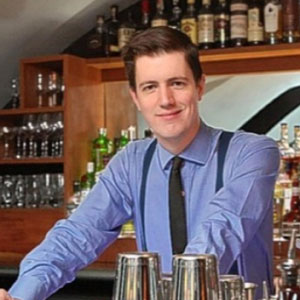Big smoke, bright lights, a bartender’s paradise. There’s no denying London’s position at the forefront of cocktail culture on a global level.
This expansive city is the very hub of the UK’s hospitality scene. There are more fantastic, high-end bars than you could feasibly visit in a week, more bartenders who can stir a Martini to perfection than secret spies to order them and more over-paid drinkers than in any other city, all looking for the latest hotspot.
London is where the brands splash their plentiful cash, where the press fuss over each opening and where careers are made. However the UK is not a one-city nation and just how much of London’s pull and clout comes from draining our other cultural hubs? From Bristol to Edinburgh this is the story of the London’s toll on the UK bar scene.

A few months ago you will have seen The 100 making headlines across the UK hospitality press, and again recently with their second meeting. This initiative to, as Stu McClusky – owner of Bon Vivant, Devil’s Advocate and El Cartel – puts it, give Scottish hospitality a kick up the arse, is a larger than life demonstration of our national struggle between the dominating capital and other cities. Scotland, for its tiny population of 5 million, has one of the strongest bar scenes in Europe.
Consider the list of people who have passed through Edinburgh’s best bars; Ryan Chetiyawardana, Iain Griffiths, Megs Miller, Shervene Shahbazkhani, Joey Medrington, Jamie Mac, Metinee Kongsrivilai, Meimi Sanchez, Steffin Oghene, Duncan McRae, Ally Martin, Chris Moore, Sam Kershaw, Georgie Bell, David Cordoba, Stu Bale and Tom Walker – and that’s just people who have moved on. Yet somehow the country is struggling for coverage and brand investment.
Frustrated with the industry, the diminishing talent pool and the lack of local and national media coverage, Stuart McCluskey, Andy Gemmell, Graham Suttle and Mike Aikman grouped together and decided to take a positive stance. Gathering 100 of the best names in Scottish hospitality, across all sectors, they’ve already started to tackle the issues Scotland faces.
“I could name a few dozen hospitality people who are from Edinburgh or have come through Edinburgh. We have a national population of 5 million, Edinburgh just 500,000 people. To lose talent like that is difficult to replace. It’s difficult to tackle as employers because we’re all proud of our venues and want to fill them with amazing staff. You have to start at the grassroots each time you get a drain south or into brand work – this is one of the 100’s focuses, scouting and finding new talent,” says Stu.
The story is similar across the UK. Based in Manchester, Tom Coates, Brand Director of Portobello Road Gin, says the north still lose people to the south all the time. “Generally it’s the guys at the top, people like Jamie Jones, the Scofield brothers – people who need to further their opportunities.
But there are some people championing the scene and it does work the other way too, Alex Proudfoot was south and had plenty of offers to be in London but decided on coming north. The staff turnover is always en masse you tend to find. As soon as two or more move on you start again at the beginning but great people have stayed and trained new generations in Liverpool and Manchester.”
There’s no way to stop the inevitable migrations to London. The city has a much bigger scene resulting in more jobs from bar backs all the way up to group bar managers who have a creative say across several sites. At that level the pay can soar up to £70k plus.

As Shervene Shahbazhani, head of Brand Advocacy for BBFB and former Edinburgh bartender, puts is; “The brain drain happens for many reasons but pay is a huge issue. In Edinburgh you’re looking at being paid for a GM role of a 500-capacity venue around £23k a year, people move to London because needs must.” The one option left is simply to slow down the en masse nature of the exits.
Richard Tring in Bristol is one of the success stories of a bartender who built up a reputation in London before returning to the south west to open his own space, Red Light. There he says the staff haemorrhage to London happens every two years as the owners build up a great scene of good bartenders who then outgrow their jobs and are forced to look outside the city for different roles. “There are peaks and troughs to any scene,” says Richard, “but with the growth of Bristol there are higher-ranking jobs opening and as groups expand there is a need for GMs and head office staff.”
Perhaps the answer here to slow down the mass exits is to have more options for people to progress. Which is where brands and budgets enter our story.
A scene cannot exist without investment, trainings and opportunities. Overall UK-based brand teams are much more aware that they need to spend money outside of London. Typically the main issue is that all the staff live and work in London so the rest of the country can definitely be an after-thought. That said PRUK send their ambassadors up and down the country, focusing on seven key cities. Bacardi is attempting to push 50% of their efforts outside of London and have employed a bigger team to do this. Even the smaller brands are looking outwards from the capital.
“The issue does need addressing, but brands are starting to spend more and more cash up north. When it came to our own brand, Portobello Road Gin, it was a no brainer to spend a lot of effort up north where the scene is so good and no one is targeting them. It is changing though, I’ve personally seen a few new roles opening up in the last few months with William & Grant, Amuthus, Eau de Vie, CASK and Elephant Gin,” says Tom. “However, there’s still a fair few more challenges and London definitely saps up the most investment.”
In agreement is Stu, who says brands in Scotland could do more. “The money that gets spent in London with activations is not even on par with the level spent in Scotland. And it’s not always about the money, many people think that’s the answer. It’s more about being creative not just chucking thousands of pounds at someone. You can make a small amount of money go a long way. Sometimes we even have to fight to take home grown talent to Scotch distilleries. It’s on our doorstep and brands should want us engaged.”
This in itself is a debatable issue. Brands who invest in trainings outside of London do have to spend more money and effort but are usually happy to do so until time after time only four or five people turn up – something Stu is keenly aware of and an issue he describes as embarrassing. “I see the attitude of I want to be the best but I don’t want to put in the effort all the time.”
Meanwhile down south Bristol faces the opposite issue of too many brands turning up to do trainings for such a small scene that not everyone can go to everything. “We’re in a state of being inundated with trainings, people forget the city is still small with perhaps 30 bartenders,” says Richard.
With more creative investments and case-by-case engagement in cities from brands, coupled with some effort from local bartenders, you can start to see how some of the gripes might be addressed. The main issue however, identified over and over, is media coverage.

For Bristol the owners and staff have the fortune of riding the wave of a south west revival, as Londoners forsake the impossibility of buying in the capital and move towards Bath, Bristol and Brighton. “If not for that it might be a different story,” says Richard. However the other UK cities, particularly in the north of the country, are struggling to get attention.
“The problem 100% is the press not covering the scene. If you look at the other side of our business, Leelex which looks after restaurants and bars, we find that if it’s not in London then the national papers don’t want to hear it. It’s a chore to get that big press and that is a big struggle,” says Tom.
One of The 100’s main focuses is to be on banging the drum for Scotland. “We need to take control and manage our destiny,” says Stu, going on to point out that the Scots don’t do any favours for themselves in thinking they shouldn’t shout too loudly about how fantastic the scene is. “I think we should dial it up, it’s tough and frustrating to see Bramble shortlisted for Tales of the Cocktail and see only a few paragraphs in the local rag. Whether its world class bars, restaurants, hotels, our best talent seems to slip under the radar and doesn’t get a break here.”
With Tales of the Cocktail On Tour planning an Edinburgh trip in 2017 there’s a real chance to get the media on side and gather the home support for the Scottish scene. Stu and his colleagues are looking to Athens for inspiration, a smaller European city which loudly praised the work of its bars and restaurants and caught the international attention of peers and journalists.
Media, brand support and retaining staff. If all these problems were fixed would London cease to be the top dog in the UK scene? The last final ingredient which raises our capital above and beyond the smaller cities isn’t the talent of the staff nor the determination of the owners, it’s the drinkers inside each venue.
London is a 24-hour city, people don’t have typical working weeks and therefore they drink every night of the week. They also tend to have a larger disposable income. While this can put the lonesome traveller at a disadvantage – they’ll never have the total undivided attention of the bartender even if it’s a Monday – it does mean London bartenders make hundreds more cocktails each week than their Liverpool or Brighton counterparts.
“London bartenders are always on. The money here means you’re busy Monday to Friday. In Edinburgh even the top bars are quiet Monday to Wednesday. And even bars outside of London who do specialise in cocktails, if you take a look at their sales mix you’ll find loads of beer and wine. London drinkers know classics, our bartenders have to deal with savvy customers who request interesting drinks and you have the global trade coming to check out the bars. Other cities don’t have that pressure or demand,” says Shervene.
While The 100 and leading figures in other cities continue to make steps to stabilise and grow their scenes London’s dominance is here to stay. With some hard work this can turn from an issue to grumble about to a working system where smaller cities get press attention and we all accept that London is a player on the international scene because we have these fantastic scenes which feed into it, providing us with a epicentre of unrivalled creativity and opportunity.
Where would London be without Edinburgh, Bristol, Manchester, Liverpool, Leeds, Brighton and Glasgow? Those are the cities which gave many of the greats their first look into the hospitality world and trained them up. These are our breeding grounds.
Or as Stu says when they first created the 100 “One of the things we wanted to recognise immediately was the people who were in Scotland who have since moved on and are doing incredibly well. We created 40 honoury members of the 100. It makes us proud, the people from here.”


